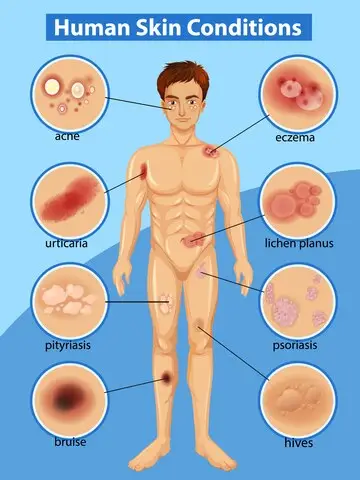Navigating the Challenges of a Common Skin Condition on Eczema


Eczema, also known as atopic dermatitis, is a chronic skin condition characterized by inflammation, itching, and irritation. While it most commonly affects children, it can persist into adulthood and often presents significant challenges for those living with it. Let’s explore the complexities of eczema, including its causes, symptoms, and management strategies, in order to foster greater understanding and support for those affected by this common skin condition.


Page Contents
The Basics of Eczema:
Eczema is a multifaceted condition with a complex interplay of genetic, environmental, and immune system factors. While the exact cause of eczema remains elusive, researchers believe that a combination of genetic predisposition and environmental triggers plays a significant role in its development. Individuals with a family history of eczema, asthma, or allergies are more likely to develop the condition, suggesting a genetic component.
Symptoms and Manifestations:
The symptoms of eczema can vary widely from person to person and may range from mild to severe. Common signs and symptoms include:
- Itching: Persistent and intense itching is a hallmark symptom of eczema, often leading to scratching and further irritation of the skin.
- Redness and Inflammation: Affected areas of the skin may appear red, inflamed, and swollen, with a rough or scaly texture.
- Dryness and Cracking: Eczema-prone skin tends to be dry and prone to cracking, especially during flare-ups or in response to environmental triggers.
- Blisters and Weeping: In severe cases, eczema may lead to the formation of small fluid-filled blisters that can ooze and crust over.
- Skin Discoloration: Prolonged inflammation and scratching may result in changes in skin pigmentation, leading to areas of darkening or lightening.
Triggers and Contributing Factors:
While the exact triggers of eczema can vary from person to person, several common factors are known to exacerbate symptoms and trigger flare-ups. These may include:
- Allergens: Exposure to allergens such as dust mites, pet dander, pollen, and certain foods can trigger eczema symptoms in susceptible individuals.
- Irritants: Harsh soaps, detergents, fragrances, and skincare products can irritate the skin and exacerbate eczema symptoms.
- Environmental Factors: Extreme temperatures, low humidity, and exposure to dry or windy conditions can contribute to dryness and irritation of the skin.
- Stress and Emotional Factors: Stress, anxiety, and other emotional factors can trigger or worsen eczema symptoms in some individuals.
- Microbial Infections: Bacterial, viral, or fungal infections can aggravate eczema and lead to flare-ups, especially in areas of broken skin.
Food Triggers:
While food allergies can sometimes trigger or exacerbate eczema symptoms in individuals who are sensitive to certain foods, it’s important to note that not everyone with eczema will have food allergies, and food triggers can vary widely from person to person. That being said, some common allergenic foods that may potentially exacerbate eczema symptoms in sensitive individuals include:
- Cow’s Milk: Dairy products, such as milk, cheese, and yogurt, are common allergens that may contribute to eczema flare-ups in some people.
- Eggs: Eggs, particularly the proteins found in egg whites, are another potential trigger for eczema in susceptible individuals.
- Peanuts: Peanuts and peanut products like peanut butter etc. are known allergens that may exacerbate eczema symptoms in some people.
- Tree Nuts: Tree nuts, including almonds, walnuts, cashews, and others, can also trigger allergic reactions and worsen eczema symptoms in sensitive individuals.
- Wheat: Wheat and wheat products with eggs, such as bread, pasta, and baked goods, are common allergens that may contribute to eczema flare-ups in some people.
- Soy: Soybeans and soy products are another potential trigger for eczema in individuals with soy allergies.
- Fish and Shellfish: Certain types of fish and shellfish, such as salmon, shrimp, crab and dried fish are the common allergens that may worsen eczema symptoms in sensitive individuals.
- Food Additives and Preservatives: Some individuals with eczema may be sensitive to certain food additives and preservatives, such as artificial colors, flavors, and sulfites, which are commonly found in processed foods.
It’s important to note that food allergies and sensitivities can vary widely from person to person, and not everyone with eczema will have food triggers. If you suspect that certain foods may be exacerbating your eczema symptoms, it’s essential to consult with a healthcare professional, such as an allergist or dermatologist, for proper evaluation, diagnosis, and guidance on dietary management. Additionally, food elimination diets should be conducted under the supervision of a healthcare provider to ensure nutritional adequacy and safety.
Management and Treatment:
While there is currently no cure for eczema, a variety of treatment options are available to help manage symptoms and improve quality of life. These may include:
- Topical Treatments: Moisturizers, corticosteroid creams, and calcineurin inhibitors can help reduce inflammation and relieve itching.
- Avoiding Triggers: Identifying and avoiding triggers such as allergens, irritants, and environmental factors can help prevent flare-ups and reduce symptom severity.
- Emollient Therapy: Regular use of emollients and moisturizers helps hydrate the skin, improve its barrier function, and reduce dryness and itching.
- Lifestyle Modifications: Practicing good skincare habits, taking a bath regularly, regular room cleaning, changing beddings, maintaining proper hydration, and managing stress can help minimize eczema symptoms and promote overall skin health.
- Medical Intervention: In severe cases of eczema, oral medications such as antihistamines, oral corticosteroids, or immunosuppressants may be prescribed to help manage symptoms and prevent complications.
Support and Empowerment:
Living with eczema can present numerous challenges, both physical and emotional. It’s essential for individuals affected by eczema to seek support from healthcare professionals, support groups, and loved ones. Additionally, raising awareness and understanding of eczema within communities can help reduce stigma and foster empathy and support for those living with the condition.
A Chronic, Lifelong Condition for Many but not to All
Eczema is typically a chronic, lifelong condition for many individuals but not to all, meaning that it can persist over the long term. While some people may outgrow eczema or experience periods of remission where symptoms are minimal or absent, others may continue to manage the condition throughout their lives.
The course of eczema can vary widely from person to person. In some cases, eczema may improve or even resolve entirely with age, particularly in children. However, it can also persist into adulthood and may require ongoing management to control symptoms and prevent flare-ups.
While there is currently no cure for eczema, various treatment options are available to help manage symptoms and improve quality of life. These may include skincare routines, avoidance of triggers, use of topical medications, and sometimes oral medications or other interventions as prescribed by healthcare professionals.
With proper management and support, many individuals with eczema are able to effectively control their symptoms and lead fulfilling lives. It’s essential for individuals affected by eczema to work closely with healthcare providers to develop personalized treatment plans tailored to their specific needs and circumstances.
A Balanced and Healthy Diet
While there’s no specific “one time magic bullet” fruit that universally cures or treats eczema, certain Veggies and Fruits can be part of a balanced and healthy diet that greatly help support overall skin health and potentially reduce inflammation, which can be beneficial for individuals with eczema. Here are some 8 fruits that are generally considered to be good choices for promoting skin health:
- Berries Family: Berries such as strawberries, blueberries, raspberries, cherries, mulberries, grapes, java plum duhat, and blackberries are rich in antioxidants, including vitamin C and flavonoids, which help protect the skin from oxidative stress and inflammation.
- Citrus Fruits: Citrus fruits like oranges, lemons, pomelo, rambutan, lanzones, mangosteen, and grapefruits are high in vitamin C, which is essential for collagen production and skin repair. They also contain antioxidants that can help combat inflammation.
- Avocado: While technically a fruit, avocado is often categorized as a healthy fat. It’s rich in monounsaturated fats, vitamins E and C, and antioxidants, which help moisturize the skin and protect against inflammation.
- Papaya: Papaya contains papain, an enzyme that has anti-inflammatory properties and may help soothe irritated skin. It’s also rich in vitamins A, C, and E, which promote skin repair and regeneration.
- Kiwi: Kiwi is packed with vitamin C and antioxidants, which support collagen production and protect the skin from oxidative damage. It also contains vitamin E, which helps maintain skin hydration.
- Watermelon: Watermelon is high in water content, which helps keep the skin hydrated. It also contains lycopene, a powerful antioxidant that may help protect the skin from sun damage and inflammation.
- Apples: Apples are rich in fiber, vitamins, and antioxidants, including quercetin, which has anti-inflammatory properties. Eating apples may help support gut health, which is linked to skin health.
- Bananas: Bananas are a good source of vitamins A, B6, and C, as well as antioxidants like dopamine and catechins, which help protect the skin from oxidative stress and inflammation.
Incorporating a variety of fruits into your diet, along with other nutrient-rich foods like vegetables, whole grains, lean proteins, and healthy fats, can help support overall health and potentially improve skin condition in individuals with eczema. However, it’s essential to remember that dietary changes alone may not be sufficient to manage eczema, and it’s important to work with a healthcare professional to develop a comprehensive treatment plan tailored to your specific needs.
Conclusion
In conclusion, eczema is a common and complex skin condition that affects millions of people worldwide. By increasing awareness, understanding potential triggers, and implementing effective management strategies, individuals with eczema can take control of their condition and lead fulfilling lives free from the constraints of this chronic skin condition. With continued research and support, we can strive towards a future where eczema is better understood, managed, and ultimately, overcome.






